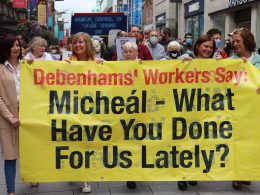For the 30 March strike ICTU has decided to only ballot trade unionists that haven’t been paid the national wage agreement. This is another example of the lack of urgency and serious approach by the union leaders to the economic crisis. Hundreds of thousands are losing their jobs. All trade unionists should be called out on 30 March and ICTU should also appeal to all workers who are not trade union members to join them.
A united stand by all workers in a 24 hour general strike on the 30 March should be the rallying cry from the trade union movement to stop job losses and attacks on pay and public services on the eve of the new budget.
A new “social partnership” deal will not stop unemployment hitting 500,000 or prevent the onslaught on wages and public services. David Begg has told the government that ICTU don’t want the public sector pension levy scrapped, just its impact on the lower paid “ameliorated”. A new deal means the pension levy will stay.
It couldn’t be clearer. In a new set of “partnership” talks the ICTU leaders will accept cuts in public sector workers wages and spending cuts in public services (health, education etc.) as well as extra taxes on workers.
The crisis in this society has exposed the failure of the market and the failure of capitalism. The rich made a lot of money during the boom. The top 1% have a combined wealth of €87 billion, whilst two thirds of workers earn less than €40,000 a year. The rich should be forced by the unions to pay for the economic crisis.
A struggle has to be waged to reclaim the trade unions from the current pro-partnership leaders who are overpaid and out of touch with the lives of working class people. In every union opposition groups are needed to mobilise the members in campaigns to democratise the unions and transform them into fighting organisations to defend jobs, living standards and public services, to defend working class people during this economic crisis.
Reclaim the unions!
Activists should unite around a programme for change that focuses on increasing internal union democracy. For annual conferences in all unions that decide policy, with smaller branches decentralised to encourage full participation by the members. For the regular election of full time officials with the right of recall by the members to ensure accountability. For all full time officials to be paid the average wage of the workers they represent, with only legitimate expenses paid. The days of union leaders being paid five and six times the wages of the members must end.
Instead of “social partnership” the unions should adopt an action programme to defend working class people and to make the rich pay for the crisis.
This programme should include cutting the working week to 35 hours without loss of pay. Share out the work and take people off the dole. Investment in a massive public development programme to create tens of thousands of jobs. Campaigns to fight the cuts in public services. For the nationalisation of all major companies threatening closure or redundancies, to be run under democratic working class control. For the nationalisation of all of the banks and financial institutions – but not the state capitalist style nationalisations that just saddle us with the debts of the rich, instead full nationalisation whereby these institutions would be democratically controlled to serve the needs of society, providing cheap credit and resources to help create jobs and fund public services.
The Socialist Party is campaigning within the unions for this type of radical change. We need a fighting leadership that always puts the interests of the working class first, that recognises that the capitalist system is at the heart of the problems facing workers and that a struggle for a socialist society is central to delivering decent jobs, wages and a future for the working class. N









